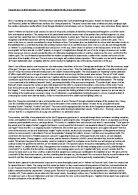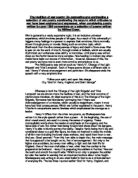“They had become soldiers and were expected to kill the enemy not only by mining but with bayonet or bare hands if necessary. This was not the life Jack had envisaged when he volunteered.” The sentiments of each soldier in section two of Birdsong support the view of love and devotion to one’s country being lost due to the harsh and brutal conditions suffered, thus supporting the opinion that all hope and faith was abandoned once the soldiers realised that the things they were promised; a gallant victory, a speedy conclusion to the war, a hero’s welcome upon their fast return, were all lies aimed to induce the men to go to their deaths. This theme symbolises a loss of love between man and his country, and sees patriotism taking a backseat to more intense loving emotions.
Perhaps the most significant form of love to arise in both the war and the literature to follow was the idea of comradeship – love for your fellow soldier. It is this underlying, deep and complex love that makes us aware of the beautiful yet tragic relationships forged by these men in the trenches: “Jack Firebrace and Arthur Shaw lay curled together in their dugout... Jack had grown used to sleeping all night on one side… He was lulled by the sound of Shaw’s deep, raucous breathing; he had become used to the contours of his body. He slept as well with him as he had ever slept in London with Margaret.” Stephen relies on Weir as a distraction from the war and Weir idolises Stephen, both depending on the other as a form of escapism from the Hell that they have grown accustomed to.
Owen’s The Sentry is another poem which has a focus on just one soldier in the war, thus making it more personal and significant to the reader. Owen uses lists to emphasise the busy and hectic scene: “but I forgot him there In posting next for duty, and sending a scout To beg a stretcher somewhere, and flound’ring about To other posts under the shrieking air”, and this makes the personalisation on the blinded soldier so much more intimate and private. The intimacy is very reflective of the friendships that these soldiers developed whilst in the trenches. The calm that the narrator demonstrates in the midst of widespread panic, “Coaxing, I held a flame against his lids”, tells me that the Sentry in the poem is perhaps a comrade of his, as he clearly cares somewhat for him, perchance more than he cares for others in the chaotic scene due to the fact that no other casualties are mentioned. Comradeship was a controversial form of love during the war, as connotations to homosexuality were made. I feel that the love these men had for their fellow soldiers was a perfectly natural and beautiful love, the tragedy being that most of these loving friendships were lost through the death and destruction of the war.
At one level, Owen’s poem Futility is a simple concept; yet another soldier has died in battle, and the warmth of the sun cannot wake him despite the fact that it created life to begin with. The hypothetical question to round up the poem is therefore inevitable: “O what made fatuous sunbeams toil To break Earth’s sleep at all?” Was it really worth creating life if all we do is destroy it? On another level, the double meanings and perpetual question within this poem leads the reader to ponder the meaning of life, and is consequently the basis for many philosophical questions. It makes you think harder about the futility of war, and raises a number of doubts concerning the power of the sun as a life-giving being. It also explores the ironic love of nature that the soldiers found themselves possessing. They are trapped in a circle of destruction; loving the beauty of nature, but being forced to demolish everything in their path. The personification of the sun, “The kind old sun”, aids to highlight this eternal beauty and give the poem a maternal air.
The surrounding environment for Stephen in Birdsong is described as being “picturesque”, and the “little islands of damp fertility divided by the channels of the split river” is the setting for the colossal war that is to take place later in the book. This sets the reader up for a huge fall, providing all of these beautiful images of rural France, only to have them literally blown away. The clear love that is expressed in every descriptive word to portray the environment and its exquisiteness stresses this ironic love once more, as the intricate attention to minute detail is lost in the utter chaos of the war later on.
Many soldiers in the war developed a dependence on alcohol, mainly as a form of escapism from the harsh reality that they were faced with every day. This need to escape meant that the men would rely heavily on sending and receiving letters from their loved ones, who in turn became figures of hope and joy for the soldiers. Owen’s letters to his mother are brimming with shocking details denoting to the nightmarish conditions endured, which came as quite a surprise to me at first. The archetypal ‘noble soldier’ shields those at home from the truth, instead adopting a false sense of optimism and security. Owen goes against this theory, seeing “no excuse to lie to you” (his mother). This direct and somewhat overwhelming honesty tells me that there was a great deal of respect between the two; he doesn’t feel the need to sugar coat the appalling ordeal he has been through in order to keep her happy.
To support this, Owen’s poem The Letter shows a soldier writing to his wife. The poem is about the soldier wishing to share everything with her, but losing the ability to escape into the idea of his home life due to other responsibilities and the chaotic scene he is surrounded by. His written word and his spoken word – written in parentheses – are shockingly dissimilar; his letter to her being fairly formal, his speech rather rough and coarse: “(Yer what? The don’t yer ruddy cow! And give us back me cigarette!) I’ll soon be ‘ome. You mustn’t fret.” By the end of the poem you see him losing all interest in the letter at all, and asking a comrade to “Write my old girl, Jim, there’s a dear”. It’s little wonder he no longer wants to continue with the list of pretentious endearments when in fact the horror was utterly unspeakable. Although the “fake” letters must have been a wonderful way to escape for the briefest of moments, it must also have been infuriating not to be able to share your mental burden with those dearest to you, which is what I feel Owen believed, and why his letters to his mother were quite so frank and honest.
The false sense of optimism is clearly portrayed in Birdsong when you read the heartfelt letters to friends and family, written before they were due to fight the battle of the Somme. They are written based on the assumption that they will be the final messages ever sent out, which makes them all the more emotional and tragic. Although they must be feeling terrified and pessimistic, their words remain optimistic and cheery; “Morale is very high”, “we can’t wait to let the Fritz have it!” and “Don’t worry about me. I am not frightened of what is waiting for me”. This is in stark contrast to the letters sent by Owen to his mother, having been censored and disguised to make them appear as if they have not a care in the world, but are merely excited at the prospect of going to their deaths. Stephen’s letter to Isabelle – the only person he feels a connection with and therefore his only form of escapism - is a far more honest and realistic portrayal of what life is like on the front line. His words make him seem vulnerable and afraid, “I am frightened of dying. I have seen what shells can do.” His letter has certain similarities to Wilfred Owen’s, firstly its naked practicality: “Some crime against nature is about to be committed”, and secondly its refusal to abide with the standard form of letters sent out. Both are examples of a respectful love, as the letters are straightforward and open, each man feeling no desire to lie to the recipient.
The passionate and violent imagery in Owen’s “Greater Love” is an interesting way to link sex and war. He has used techniques such as alliteration to give the poem a melodic vibe; “O Love, your eyes lose lure”, which works to conjure forceful images, like a flame dancing, or two bodies merged together. The poem portrays love as an intense and violent entity, which links it strongly to war. Fighting and carnage, despite their nauseating qualities, are created and executed with intense and passionate emotions similar to those presented in this poem.
Stephen’s erotic interest towards Isabelle in Birdsong is suggested by his detailed analysis of her every move, quirk and characteristic, such as his description of her having “a light scent of rose soap” and of her lips leaving “no trace of their presence on the wine glass”. He has an extremely acute attention to detail, which shows the immense interest he holds for Isabelle. The fiery passion between Stephen and Isabelle in pages 58-61 reflects the horrors that have yet to come; “Her face and neck were suffused with a pink glow where the blood was diluted by the colour of the milky young skin”, “He looked at her fiercely”, and represents the zealous aspect of love which is significantly recorded in the book.
Love is composed of many intense elements, and remains the subject of much confusion after thousands of years of deliberation. Such concentrated emotions as experienced during the war are bound to elicit a love at a measure never before witnessed, and these two forms of writing prove this. Love is shown in these texts through comradeship, pride, dependence and patriotism. Love is therefore presented as both a struggle and a blessing in these two styles of writing, Owen using mostly images of Hell and nature to invoke tender feelings, such as the personification of “The kind old sun” in Futility and “the haunting flares” in Dulce Et Decorum Est; Faulkes using emotive language and character relationships to portray the sadness and the loss encountered during the war. Both are successful in their attempt to show love enduring everything, and of love being borne from human nature’s lust for survival.
Footnotes
¹Owen’s poem Dulce Et Decorum Est was originally dedicated to Jessie Pope, but under the advice of Sassoon, Owen settled for using “My friend” to represent her, believing that a name check was perhaps too strong.
Bibliography
Essays read:
/ literature/dulce_et_decorum_est.htm
Books studied:
Wilfred Owen: The War Poems. (Chatto & Windus LTD, 1994)
Sebastien Faulkes: Birdsong (Vintage, 1994)









